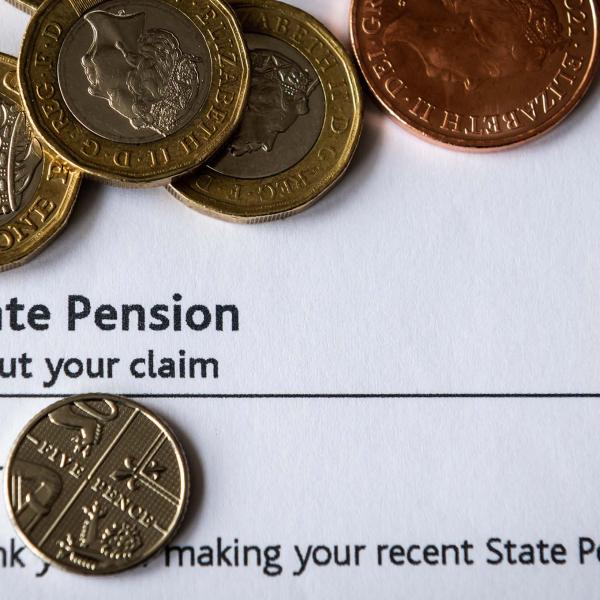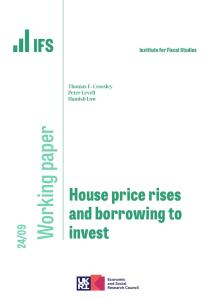
We talk through the challenges facing the UK pensions system and future generations of pensioners.
Paul Johnson
Hello, and welcome to the IFS Zooms In. I'm Paul Johnson, Director of the Institute for Fiscal Studies, and today we're going to be talking about the future of pensions. Last week, we at the IFS launched a new review, supported by the abrdn Financial Fairness Trust, looking into the challenges facing the future generations of pensioners, from low homeownership rates, to undersaving, to the transfer of risk from the state and from companies to the individual. Without policy action, these mean that many people could face really big financial difficulties in older age.
So, in this episode we're going to unpick some of the key issues. Joining us today are Heidi Karjalainen, a researcher at the IFS, and Jonathan Cribb, an associate director here at the IFS, and both of them are heavily involved in the pensions review.
Last week, alongside launching the review, we launched our initial analysis of the problem, and contrasted that, I think it's fair to say, with the success that the current generation of pensioners are broadly enjoying. So, Heidi, before we get on to the core of this, which is the future, and our worries for the future, could you just take us through briefly what's happened to the current generation of pensioners and how well they're doing?
Heidi Karjalainen
Yeah, so, if we're looking at the current generation of pensioners, they are doing very well on average compared to previous generations of pensioners. So, back in the 60s, 70s, 80s, we saw really high income poverty rates, for example, among pensioners, so, income poverty rates of 30, 35% and above. So, when we're looking at current generations of pensioners, income poverty rates, for example, are closer to 18%, so, we've seen a big improvement there. And actually, if we're comparing the current generation of pensioners to current workers, we're also seeing that the average incomes of people above the state pension age are similar to the average incomes of those below the state pension age. And actually, the pensioner poverty rate among pensioners is now below the national average. So, we've really seen big improvements among the current generation of pensioners, and of course that's a combination of things like higher state pension entitlements, higher private saving into pensions, as well as more and more pensioners being able to work past the state pension age and into older ages.
Paul Johnson
Those are really striking figures. I'm old enough, actually, to remember the time when, in the UK, pensioners really were the poorest group in society, and now they're less likely to be poor than most other groups. And that thing you said Heidi is remarkable, isn't it, that the incomes of pensioners, once you take account of housing costs and the cost of children, are no lower than those of people of working age. So, it's not just they've got all the wealth, which you might expect from older generations, but they've also got disposable incomes as high as those of working ages. Which, of course, because over time incomes increase, means that on average, pensioners today have bigger disposable incomes than they had during their own working life. Jonathan, just perhaps you could expand a little more on what's driven this remarkable change over the last generation or two?
Jonathan Cribb
Yeah. So, I think there's actually a combination of positive and negative trends here. The positive trends are greater levels of work past state pension age, state pension entitlements going up, a combination of greater working lives and reforms which have either increased the general level of the state pension or the amount they can, the proportion of the full state pension people are getting. And a big thing is the greater accumulation of private pension wealth on top of that, although that does disproportionately, of course, go to the kind of top half of the pensioner income distribution, relatively little to poorer pensioners.
The negative thing is of course, we've had 15 years of the working-age population doing really badly, frankly. The pensioner population keeping up with the working-age population has not been that difficult over the last 15 years, because of how poor particularly the earnings of workers have been. So, that is the bar against which pensioners are being set and maybe it isn't quite as high a bar as we might wish.
Paul Johnson
Which takes us nicely on to the issue of future generations, though let me just stress what you said there, Jonathan, that clearly there's a lot of inequality within both the pensioner population and the working-age population, and we're obviously to some extent talking about averages here, and there are poor pensioners and if you are only surviving on the basic state pension, £200 or so a week, that's not a lot to live on, but it's a lot more than someone under pension age is surviving just on benefits. But it's really important to be clear that we are not saying that all pensioners are rich here, it's just that on average, as a generation, they're doing much better than previously.
But this point about low earnings growth among younger generations is just one of the worries about the future. We've just been through, as it were, some of the reasons current pensioners are doing so relatively well, most of them, 80% or so, own their own home, a large fraction have defined benefit occupational pensions, state pensions, and state benefits, more generally have been going up faster than prices for some while. So, things are looking quite good for this generation. What is the worry about the future, Heidi?
Heidi Karjalainen
So, we identified a number of challenges when it comes to the financial security of future generations of pensioners, and maybe I can start with thinking about private pension saving in particular. So, in the last decade or so we saw the introduction of automatic enrolment, so this is the policy under which employers now automatically have to enrol their employees into a pension scheme, unless the employee opts out of the scheme. So, thanks to this automatic enrolment, we've seen a huge increase in the number of people, in the private sector, who are saving into a pension. So that's a good-news story. But then when we're looking at the amounts that people are saving into their pensions, they are on average very low. So if we take middle earners, more than half are saving less than 8% of their earnings, whereas the Pensions Commission, which we mentioned earlier, the last review of the UK pension system, they recommended a saving rate of more like 15% of earnings. But we see very few people actually saving those kinds of amounts into their pensions. So that's sort of the first challenge is that even though we've seen a big increase in the number of people saving into pensions, the amounts that they're saving are on average very low.
Now there are also groups of people who are not benefiting or do not fall under automatic enrolment rules, such as the self-employed. So, we've seen a big increase in the number of self-employed workers in the UK, but less than one in five of them are actually saving into a private pension. And as you mentioned, on the other hand, at the same time as we've seen lower levels being saved into private pensions, we're also seeing a fall in homeownership, more and more people living in the more expensive and more insecure private rented accommodation sector. So those are some of the challenges when it comes to private saving in particular.
Jonathan Cribb
Maybe I can just pick up there to come back to Paul's point, actually, about inequality. Because I think that in general the types of people we are most likely to be concerned about on this metric are middle-income people. Because the lower-income people are going to get a fairly good deal out of the state pension, because it's flat rate, pretty much the same for everybody, that provides a better replacement for poorer people than higher earners. And automatic enrolment, while hasn't created people saving at 15%, is going to give a lot of people at least a small amount of private wealth as they approach retirement, which many poorer people would not have had at all.
On the other hand, frankly, the highest-income people are all likely to own their home by the time they come to retirement, and whether or not they accumulate wealth purely in a pension or in other assets, I don't think we need to be too concerned about quite how much wealth the, say, top 20% are accumulating for their retirement. So, I think distributionally, I think there is a kind of particular concern or interest in the middle of the income distribution.
Paul Johnson
That ought to be worrying politicians, if there's any group that ought to be worrying them, it is Middle England, Middle Scotland and Middle Wales, of course. What you've both gone through there is this issue of low levels of contributions, this collapse in homeownership, and actually one of the things that surprised me from the report that we published last week is there's already been quite a big increase in the fraction of people in their 50s who are private renters relative to previous generations. And one of the issues there is more people will be hitting retirement, either having to find lots of money to pay their rent, or dependent on housing benefit which will cost the state more money.
But in terms of the contributions to pensions, Heidi, it's not just the level of contributions, it's also the fact that we used to have these traditional occupational pension schemes, defined benefit schemes, still common in the public sector, now almost gone in the private sector, and they've been replaced by these personal pots, what we call defined contribution schemes. So, it's both the amount that's going in, it's also the structure of the pensions.
Heidi Karjalainen
Yes, so, it's not just about the amounts that people are saving into their pensions, but if you're thinking about how much money you're going to have in retirement, or at the end of your career in your pension pot, that depends on how much money you've put in, but also how the investments in your pension have done over your career. Now, if we're thinking about a defined benefit pension, as you mentioned these traditional occupational pensions, you would agree with your employer a formula that determines how much income you'll have in retirement based on how many years you've been working, and your salary, your final salary, or your career average salary usually. That formula doesn't mention how the investments in your pension will do over your career, whereas with these defined contribution pensions, the amount of money that you retire with is determined by how much you put in, but also how the investments are performing over this period. So you can see that, in the past, if asset returns were lower than what you would have expected at the start of your career, that was all up to the employer then to make up for, because they had guaranteed this level of income that you will get based on the years of work that you do and the salary that you get. Whereas nowadays, if under a defined contribution pension you experience lower asset returns than you had expected, that's all now up to the individual to then deal with. So yes, it's not just the amount of money that we're putting in, we've also seen this transfer of risk - in this case the risk I'm describing is investment risk, that has been transferred from the employer to individuals with this shift from defined benefit to defined contribution pensions.
Paul Johnson
And that issue of risk is something we might come back to in a minute, but it's a really important bit of context, I think, for the review that we're doing: this shift in risk from employers, insurance companies, government onto individuals. Just 25 years ago, more than 40% of people in the private sector were members of occupational schemes, and now it's down to 10% or less. And one of the reasons for that is that so much risk, in a sense, was piled onto employers, and I really liked what Lord Adair Turner said at the launch of our report, is that “who killed occupational pensions?” and he said it was like Murder on the Orient Express, everybody and everything killed them. It's increased longevity, it was reduced returns in the stock market, it was increased regulation, all of these things between them each kind of chipped away at the case for employers to run these schemes because the level of guarantee that regulation insisted that they give was also so high, and there was no risk left with anyone other than the employer under those situations.
Before we say a bit more about that, the UK is not unique in facing challenges of an ageing population and the amount that we need to spend on pensions. Jonathan, how do we look internationally in terms of our sort of future pension system?
Jonathan Cribb
The big thing to know about how we compare to most developed countries, particularly compared to most European, Western European and Northern European countries, is our reliance on private pensions as opposed to purely state pensions. Now, frankly that has some advantages and disadvantages. It does mean that we have all of these conversations about how much do people save, how should that be invested, what are the regulations of this, what's the contributions from employers or individuals, compared to other countries where generally state pensions are higher, they provide earnings replacement and they're financed often through high social security contributions. That's a kind of very different structure to how we have our pension system.
I think the advantage that we do have in this, is that then with all of these countries, all of the countries frankly are now ageing, there is going to be stress placed on the public finances by the fact that a higher fraction of the population is in older ages or above pension ages, and the fact that we don't spend quite so much of our GDP on state pensions means that there's slightly less stress there in terms of spending pressure on public finances, compared to somewhere like France or Italy as particularly countries which have particularly large amounts of spending on state pensions.
And then the other thing really is about the ageing population, is to an extent about demographics. You know, how two main things are generating an ageing population, the higher life expectancy and the kind of changing cohort size, the big baby boomers coming through into retirement compared to relatively lower fertility rates which produce fewer working-age people. On this kind of measure again, the UK is doing a bit better than Western Europe, we've got higher fertility, higher immigration, but we're not doing as well as somewhere like Australia or the United States.
Paul Johnson
Yeah, it's fascinating, as you say, we spend, in terms of state spending, a lot less than most Western European countries on pensions. But of course, there are other exemplars, in Australia which has a means-tested state pension and much higher compulsory levels of contributions to private pensions. You talked about numbers of pensioners, demographic change, state pension age and so on. Another thing I hadn't realised from the report we published last week was that the number of people or, sorry, the fraction of the adult population over pension age hasn't shifted in 50 years. Now I had not realised that, I had assumed our population had been ageing, and of course there are two reasons for that, I mean it has been ageing. First, we have had quite a lot of inward migration, nearly all people of working age, and secondly, the state pension age has been rising for women since 2010, and from 60 to 66, and for men from 65 to 66. Looking at that, what role does increasing state pension age have in dealing with some of the future public finance and demographic problems? And it's always felt to me at least, we seem to be able to have a bit of a better conversation about that here than in France, for example, where they've had months of rioting in order just to get the state pension age to 64, whereas we're debating about when to take it to 68.
Jonathan Cribb
And David Gauke, who's one of our steering members on this project, said of the review that increasing the state pension age was an easy thing to do for him as a former Secretary of State, compared to the problems President Macron is facing. I think there should be a bit of context here, which is, again, our reliance on private saving or the balance of private and state pension saving means that a state pension age is not quite as fundamental to the UK pension system as it is in France, where almost all pension wealth is coming from the state. We have more ability to retire earlier, for example.
Paul Johnson
And indeed, I think it's true that only a relatively small fraction of people actually retire at the point of the state pension age; people often refer to it as the retirement age, but it really isn't.
Jonathan Cribb
Yeah, about 1 in 10 people in the UK retire almost exactly at state pension age.
Paul Johnson
That's really, again, I didn't know that statistic, only 1 in 10 retire at state pension age and the majority retire well before that.
Jonathan Cribb
Yeah, absolutely. And that 1 in 10 means that when you push the state pension age up, only about 1 in 10 delay their retirement to the new state pension age. There are some differences there, you say what role does the higher state pension age have? It is one parameter, or element, that the government can use to reduce the cost of state pension spending, and there has now been a kind of long-set-out argument around the fairness of increasing the state pension age, when longevity goes up, to mean that the kind of state is not supporting people for ever-increasing fractions of their adult life. So, there's two things there, there's a fairness argument which we consistently made, and you know this just being one element of a way of controlling the kind of public finance issue.
Paul Johnson
And Heidi, one of the things that's striking about the increasing state pension age is the impact that it has on poverty. We’ve already discussed that poverty rates among pensioners are really quite low, but one of the groups with the highest poverty rates are those just below state pension age.
Heidi Karjalainen
Yeah, absolutely. So, we've done some research looking at the increase of the state pension age from 65 to 66, and actually we found that the income poverty rate among that group of people who were affected by the increase in the state pension age more than doubled. So, a really huge increase, and a lot of that has to do with the fact, as we've already discussed, that the state pension is so much more generous than working-age benefits for those who are below the state pension age, so that's why we're seeing such a big impact.
And also, as Jonathan already mentioned, while some people are pushed into continuing work and delaying their retirement through the increase in the state pension age, we found that was only about 8 in 100 when we looked at this increase from 65 to 66. And I think another thing to really note there is that, of course, delaying retirement is going to be a lot more difficult for people such as those who have caring responsibilities, people in poor health, and people who are involuntarily unemployed. And of course, as we keep on pushing up the state pension age, more and more people are going to be in poor health, and actually people with lower levels of education will have even higher levels of poor health, so these continuing increases in the state pension age is going to make it more and more difficult for more people to continue to work.
Paul Johnson
And I think this is one of the things we're going to have to look at as part of our review, which is that in principle as longevity, as people's lifespans increased, it makes sense to increase the point at which you start to get a pension, but there is an equity issue here that people with lower education and lower incomes tend to live less long, but also, as you say, quite a substantial fraction of people in their 60s are disabled by official measures, or by self-reported measures, and find it difficult to work. And of course, the other big change over the last 20 years or so, 25 years, has been this increasing gap between the level of benefits available to pensioners and those available for people under pension age. So, if you look back 30 years, 25 years, there was about a 30% bump up in your income if you hit pension age, it's now well over 100%. The minimum amount available for pensioners is at least twice, more than twice, the minimum amount available if you're just under pension age, which is one of the reasons that you said you get this big spike up in poverty as you put the pension age up, because you delay the point at which those on the very lowest incomes can get those more generous benefits. And of course, Heidi, one of the challenges going forward, Jonathan's referred to it, is an ageing population increase, demographic change increase, pressure on the public finances, and at least thinking about the pension age is one tool we have to control some of those costs. We have other tools presumably around the rate at which we increase pensions and so on.
Heidi Karjalainen
Yeah. So, the state pension age increase is one of the levers that the government has when it's trying to determine how much we're spending on pension benefits. But another feature of the state pension that we've seen in recent years, that's very different from working-age benefits, is that the state pension every year increases in line with what we call the triple lock. So, it increases in line with the highest of prices, average earnings and 2.5%. And what that means is that while working-age benefits are increasing in line with prices, because the state pension is increasing in line with the highest of these three measures, basically the state pension is catching up with both working-age benefits and actually in recent years has also been catching up with average wages. So of course, that's another metric that the government needs to consider when they're deciding how generous state pension is going to be.
You know, one of the justifications for having this triple lock is that there was somewhat of a desire to make the state pension more generous than it used to be. But of course, this way of increasing the state pension or the relative generosity of the state pension is quite arbitrary, because this year we've seen an increase of 10.1%, which was the same as it was for working-age benefits, but in other years these increases might be very different and might be very different between state pension and working-age benefits.
Paul Johnson
The consequence of all of that is on current projections we're likely in 50 years or so to be spending, in current-day terms, £100 billion or so more on pensions. Plus, even more, in addition, on things like health and social care, so the pressure on the public finances in the foreseeable future is really quite substantial. I don't know if either of you wants to come in on that?
Jonathan Cribb
Just the fact that £100 billion, not many people know what £100 billion means, but that's 4% of national income or it is double the entire defence budget.
Paul Johnson
Very well put, it's a lot of money, so we really would have to - and this is one of the issues I think that politicians are not keen to talk about, it's very hard, and we've said this in different contexts, it's very hard to see a future in which we're not paying significantly more tax just to keep the welfare state as it is, in terms of particularly pensions and social care and health, unless we're willing to do something really quite different - have a much higher state pension age or have much higher levels of private provision of health, or find some other part of state spending that we're not going to provide.
I want to go back to something we mentioned earlier as a final part of our conversation, which is this issue of risk, which I think for me is probably the fundamental issue here about the design of a pension system. As we've discussed, it used to be the case that through occupational schemes employers held a lot of risk. There used to be a state pension where there was an earnings-related element to that. We no longer have compulsory annuitisation, now what does that mean? It means people with their defined contribution schemes effectively hold the risk of their own lifespan. Heidi, how do you think, as a review, we're going to deal with this issue of risk where we know at the moment it's the individual holding some, so much of that?
Heidi Karjalainen
Yeah. So that really is one of the key issues is that because there's so much risk on the individual, there's a lot more responsibility on the individual in making sure that they have an adequate standard of living in retirement. And at the moment I think there's a bit of a, maybe a misconception that for example the default rates that the government sets under automatic enrolment, the government says that the minimum that employers and employees have to put into a private pension under automatic enrolment is 8% of qualifying earnings or pensionable pay. And for a lot of people, they think that, okay, the government tells me that the minimum is 8%, so that must be enough. So basically, we have this issue where if people are just following the kind of defaults, they're not necessarily making the best decisions or the right decisions. So, I think we need to make sure that the defaults are set in a way which ensures that people will have a standard of living in retirement that they might expect.
Paul Johnson
Jonathan, just on the last bit, I just want to mention, is annuitisation and the risk of how long you're going to live. And there's lots of striking stuff in this report - I would recommend that listeners go to our website and look at this - but another thing that's stuck in my mind is that if you're a 66-year-old man, you've got a one in four chance of living into your 90s, which is the good news, but you've got a one in four chance of not making it anywhere near 80, which is the bad news. But you've got a pot of money and you need to decide how to make that last, either for what might just be a few years, or might be 25 years or more. How are people supposed to deal with that? Where do we go with that level of risk and uncertainty? It's not an easy question.
Jonathan Cribb
Okay, so, people don't know when they’re going to die - they might have some sense depending on their health, or when their parents died or things like that - but you're right, there's a lot of uncertainty there. One way of dealing with that is to buy an annuity, people don't have to buy an annuity anymore, and indeed they're not going out and doing so, whether because they don't look like good value for money or there's understanding problems or things like that. I do think that it's really rather strange that we now have a system which, because of difficulties around making decisions about how much to save, we have automatic enrolment, we default people in, we use inertia - we being the pension system - use inertia to get people saving more, at the point that you come to retirement, all that inertia has gone out the window and you need to make some seriously big decisions.
Of course, I think these decisions are going to be much bigger, much riskier for people with bigger defined contribution pension pots, who are going to be more likely middle- or higher-income people. The importance of this issue is going to be smaller for poorer people with smaller pots where it's not going to make that much of a difference exactly what they do with it, so there's a distributional angle there. Some people do have other annuitised resources in terms of housing, in terms of state pension, and some people in small amounts of DB pensions. So, I think we do need to think about all of these things quite carefully about how they fit together.
Heidi Karjalainen
And I think in terms of, I mentioned defaults, but and as Jonathan said, right now there are no default options once you reach retirement with a defined contribution pension pot, and that's something that's been discussed in the pensions industry: are there some options that we could at least provide people to say you can take some money as a tax-free lump sum, and then maybe with the rest you want to buy an annuity now, you might want to buy an annuity also five years from now and so on to benefit from different annuity rates? And those kinds of default options don't exist yet, but maybe that's something that we should think about.
And I think that's particularly important because now, it's not just that people reach retirement and then they make one decision at retirement; if you keep your pension pot untouched, you're going to have to make decisions about how to use that pension throughout your retirement. And we know that people, especially in their 70s, 80s, 90s, experience, in some cases, quite fast rates of cognitive decline, so making that decision around how to use your pension is only going to get more and more difficult as you age, and as you move further into retirement.
Paul Johnson
Absolutely. And the difficulties here, I think, in terms of managing your income through retirement are, you know, going to be one of the big issues for public policy over the next decade. It's not a huge issue at the moment because not many people, as you say, have significant pots in these defined contribution pensions, but over the just the next decade, actually, I think that's going to change quite significantly. And to reiterate Jonathan's point about these not looking like good value, a £100,000 pot will buy you about £4000 a year, I think, in terms of an annuity which goes up in line with inflation; £100,000 sounds like an awful lot, £4000 really doesn't, so you can see why people are not that keen on buying these.
Jonathan Cribb
Yeah, there has been an underlying worry about the kind of challenges from pension freedoms and non-compulsory annuitisation, but those low annuity rates are one reason why lots of people welcome these and the opportunity to spend the money in a different way.
Paul Johnson
And it's one reason why the change was made. I think one of the things we will need to look at is whether, again, there is some more scope for risk sharing in annuitisation, so the state takes the risk that you'll live beyond 85 or 90, or any changes in regulation, because at the moment companies effectively have to invest all of this in very safe assets.
But we could carry on with this forever, it's been a fascinating conversation. I'm afraid we economists always manage to find the cloud to every silver lining, in the sense that look at the world today and it looks great in terms of pensioner income, but the cloud is that the future doesn't look so good. But we will be doing more work on these issues over the next two-and-a-half years, and hopefully we'll be able to come back in two-and-a-half years’ time and tell you all the answers to all of these problems, or at least, the very least, set out some of the options.
So, thank you so much for listening to this episode of the IFS Zooms In. To see more of our work do visit www.ifs.org.uk. And to further support us, please do consider becoming a member for as little as £10 a month. You can find out more in the episode description. See you next time.
Listen now: Apple Podcasts | Spotify | ACAST | Stitcher | YouTube | Google Podcasts | RSS
From declining homeownership rates and low pension saving, to high numbers of self-employed people with no pensions at all, it seems that future generations face steep challenges in retirement.
Recently, IFS launched a new review of the pensions system, supported by the abrdn Financial Fairness Trust, to look into these issues and seek policy solutions to help politicians navigate these challenges.
Joining us today to talk through the challenges facing the UK pensions system are Heidi Karjalainen, a researcher at IFS, and Jonathan Cribb, Associate Director at IFS, who are both involved in the review.
Zooming In: discussion questions
Every week, we share a set of questions designed for A Level economics students to discuss, written by teacher Will Haines.
- What is the difference between a defined contribution pension and a defined benefit pension?
- Why has French government's decision to increase the state pension age from 62 to 64 been unpopular despite the UK state pension age being 66?
- How do the UK government find a balance between continuing to increase the state pension age in line with higher life expectancy and ensuring those in the age bracket just below the state pension are able to afford a good standard of living?
Related content
Host

Director
Paul has been the Director of the IFS since 2011. He is also currently visiting professor in the Department of Economics at University College London.
Participants

Associate Director
Jonathan is an Associate Director and Head of Retirement, Savings and Ageing sector, focusing on pensions, savings and later-life economic activity.

Senior Research Economist
Heidi is a Senior Research Economist in the Retirement, Saving & Ageing sector. Her current research is on pensions and saving for retirement.
Podcast details
- DOI
- 10.1920/pd.ifs.2023.0008
- Publisher
- Institute for Fiscal Studies
More from IFS
Understand this issue

The future of the state pension
21 December 2023

What does the Conservative's 'triple lock plus' announcement mean? And what's the context around tax and the state pension?
30 May 2024

Election Special: Your questions answered
27 June 2024
Policy analysis

How have the size and shape of the UK state changed?
9 June 2024

What are the parties’ plans for benefits and taxes?
24 June 2024

How do the last five years measure up on levelling up?
19 June 2024
Academic research

House price rises and borrowing to invest
27 March 2024

Unfunded mandates and taxation
14 March 2024

Police infrastructure, police performance, and crime: Evidence from austerity cuts
24 April 2024